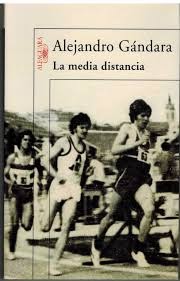
Original Language: castellano
Year of publication: 1984
Valoración: Alright
This his first novel was written by Alejandro Gándara with only twenty -seven years and is clearly a youth work, in which the author speaks of his own experience, which he lived at that stage where one takes off from the pasty adolescence and begins to cross doors that he did not know. It is a short process, although of course it depends on each one, sometimes it is extended in an unheard of when it is allowed to get tangled in that tangle of unknown sensations and, for fear or comfort, it is not decided to pass the screen. On other occasions, ask our grandparents for example, the evolution lasts less than the sunset in the tropics, and the young man is suddenly bound to maturity without having been able to taste the end of childhood a little, which also has its charm.
It seems that Gándara practiced athletics, and wants to record that sports experience, which is a vehicle I think very valid to affirm that transit. Thus describes the training, the relationship with his classmates and with his coach, but above all the races, the sensations, the fears and what would be the topic of the loneliness of the background corridor. There are no dreams of greatness or apparently fear of failure: the young man runs because it is what he has decided to do and it is what does really well, his ambition comes so there. The story seems accurate, defining more physical than mental moments and sensations, although it gives the feeling of thicker and acquire a depth perhaps imposted.
But sports activity, being the conductive thread, also does not occupy the whole space. This is not Fire cars, although neither does that book of Murakami in which the marathons merge with the profession of writer. Gándara also explores the experience of the young man who, pushed by the sport, is looking out to new situations: life outside the people, contact with strangers, love threats, the disease.
Without becoming at all, he has some formation novel, and shows the clear first work seal that the young man talks about what he knows very directly. The truth is that Gándara writes well, and this allows him to sustain to some extent a narrative that is sometimes inconsistent. That is why perhaps it shines more when it focuses on a single episode, such as the experience itself or, above all, in the long description of fevers suffered in the remoteness of a pension. It is in my opinion a superb passage, easy to imagine but very difficult to solve before the blank paper, with that level of detail, intensity and immediacy, as if I had been writing in real time.
The rest of the narrative seems quite irregular, with a certain abuse of introspection, and somewhat irritating when, too often, the characters (after all very young people) always seem to speak with metaphors or philosophizing all the time. Poetic prose somewhat recharged and that desire to exhibit ingenuity and acuity are perhaps signs of immaturity, those things that time and also work are polishing, but that in this case it is inevitable that they end up causing some disconnections with the reader. At least that is what happened to me. It would be necessary to see how the author has evolved, but for my part I doubt that he will give him more opportunities.
Source: https://unlibroaldia.blogspot.com/2025/05/alejandro-gandara-la-media-distancia.html


